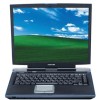Toshiba Satellite A10-S127 Satellite A10/A15 Users Guide (PDF) - Page 42
Front with the display open
 |
View all Toshiba Satellite A10-S127 manuals
Add to My Manuals
Save this manual to your list of manuals |
Page 42 highlights
42 Finding Your Way Around Front with the display open Front with the display open Screen Speaker Power button Keyboard Palm rest Primary control button System indicator panel Speaker Function keys TouchPad Secondary control button The computer's screen is a liquid crystal display (LCD) that provides clear, sharp images. For more information about viewing options, see "Exploring video features" on page 175. The speaker lets you hear sounds, such as system alarms associated with your software, and music from DVD-ROMs and audio CDs. The power button turns the computer on and off. Holding down the power button for four seconds resets the computer. The function keys, when used with the Fn key, activate several different system functions. For more information, see "Hot Keys" on page 228.















